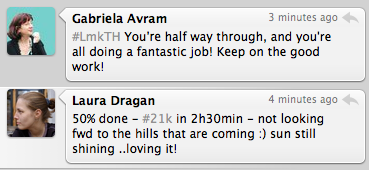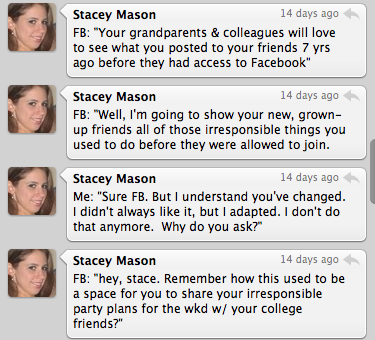by jodi

Long discussions cause challenges for Wikipedians. That’s great motivation from some of my work.
Such discussions can often present a challenge to the editor who steps up to close them; “no consensus” is a common outcome for convoluted debates, a lack of resolution that opens the possibility of discussion starting all over again as the same issues continue to arise.
– Wikipedia Signpost, 2012-03-19
The report also links to Wikipedia’s essay on Too long; didn’t read; image from KnowYourMeme’s coverage of tl;dr.
Tags: coordination on Wikipedia, quotes, tl;dr, Wikipedia
Posted in argumentative discussions, PhD diary | Comments (0)
by jodi
Google Books is buying into the “fail whale” meme with their own. Moby Dick, ahoy!
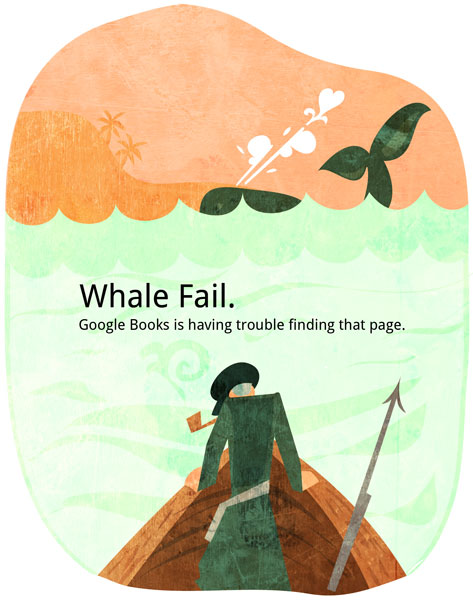
Spotted via @ryancordell, original spotter was @ThomasRuysSmith.
Tags: fail whale, Google Books
Posted in random thoughts | Comments (0)
by jodi
Marcel asked:
>http://bottlenose.com/
>anyone with experiences and opinions about it?
Definitely worth trying–it focuses on your network in order to pull more interesting stuff to the fore. I put it in my bookmar bar when I first encountered it — it was briefly useful (slowed down the stream, found things that my network had heavily retweeted, making interesting suggestions of the few things I should read).
Its classification is ok — the genre classification seems decent (news/videos/pictures) — the message type classification (Question/Opinion/Notification/Check-In/How-To/etc) seems less exact, but may still be useful.
It kept suggesting the same things so I stopped checking it regularly — but I just checked it and am intrigued since they’ve added some features. In particular, they seem to be pulling out keywords (you can visualize one/all of people, topics, hashtags, message types–see screenshot). That might be especially interesting when doing exploratory searches.
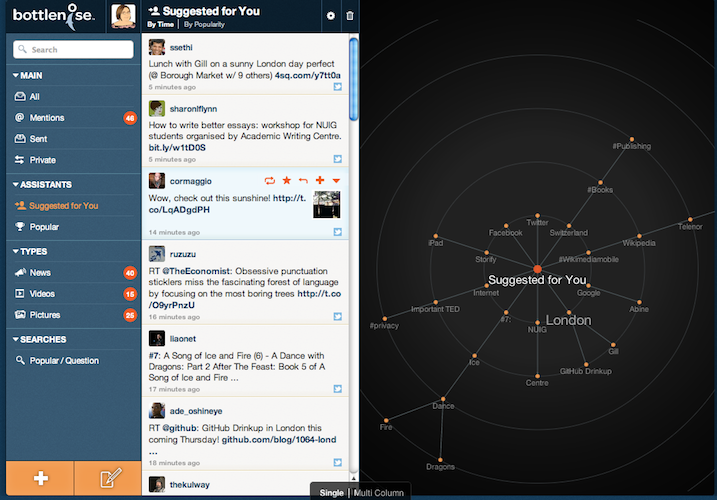
There’s also a lot of customization possible — you can make your own rules for what to put in streams, and they have a wizard (screenshot below):
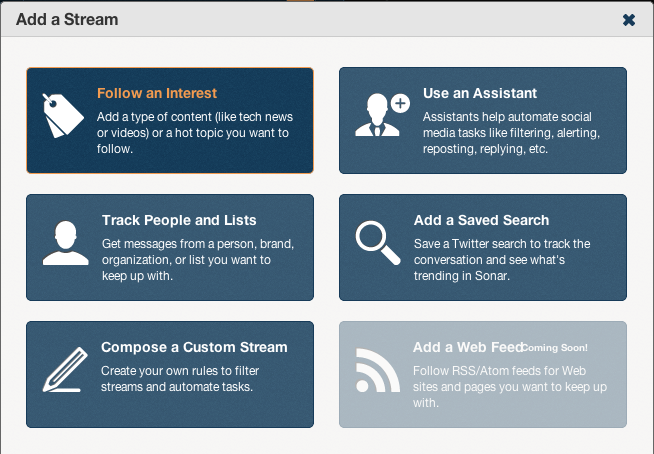
If there were a marketplace for sharing rules, that might be good — I’m not likely to spend time on customizing my own, so I’m just relying on the defaults (‘suggested for you’ and ‘popular’).
I’d be cautious of posting from Bottlenose without first checking the documentation — they accept posts of any length, but may also modify them (add hashtags, say).
I suppose for some people, the ability to pull in from multiple networks (for now Twitter & Facebook) could be useful, though there are lots of tools that do that.
I’d be curious to hear what other people think–have you found uses for Bottlenose?
-Jodi
PS-They seem to be going by klout score for invites for now; if you can’t get in that way, give me a shout (I’ve 10 invites if you want one).
—-
I’m taking a listserv post as the source of a blog post again; channeling jrochkind I suppose.
Tags: Bottlenose, filtering, Klout, social media analysis, twitter
Posted in argumentative discussions, information ecosystem, social web | Comments (1)
by jodi
Today I’m at the CSCW workshop on Collective Intelligence as Community Discourse and Action.
The day started with an introduction from Gregorio Convertino to the previous workshops.
Then Simon Buckingham Shum provided mutually overlapping categories for the workshop topics:
- Empirical studies
- New Tools
- Discourse analysis
- Sociality and social networks
- Reflection and argumentation
- Annotation
- Crowdsourcing Dynamics
- Civic Intelligence
- Organizational Intelligence
I’m sorry that I’ll miss the World Cafe this evening (must run off for the doctoral colloqiuum). The plan is for the group to split into four topics for discussion:
- What do we already know about CI?
- Why should we care?
- What are the major obstacles?
- Tell me a CI story from the future
Twitter hashtag for the workshop is #cscw2012ci
Tags: Collective Intelligence, community discourse and action, CSCW, CSCW12, CSCW2012, discourse analytics
Posted in argumentative discussions, PhD diary, social web | Comments (0)
by jodi
I had never heard the term “flipped” teaching, so I wanted to make a note of it, via Mel Chua, who says:
my classmate Nikitha’s project for pedagogy class: redesign Purdue’s MATLAB-heavy intro-to-engineering first-year class to use a “flipped” model – view lectures at home, work on homework in class where there’s help available. (Mind you, this doesn’t mean they’ll implement it; she’s a TA, not the prof. Still, it’s cool.)
Flipped teaching is one of the ideas that could help sustain and justify small-group teaching as highly scaleable online learning becomes feasible and productive; MSNBC notes that, “Apparently even the Stanford students preferred watching the classroom lectures as online videos on their own time.” They report that 85-90% of Thrun’s in-person AI class at Stanford AI had stopped attending by the end of the class. Imagine Thrun’s shock: “These are students who pay $30,000 a year to Stanford to see the best and brightest of our professors, and they prefer to see us on video?”
In-class homework is not a new idea: the success of Berkeley’s Math/Science Workshop and UT’s Emerging Scholars Program (which I TA’d back in the days when I taught calculus) was based on providing challenging problems and group study support in class.
Nor is avoiding lecture: It would be interesting to compare the underlying philosophy of flip teaching to St. John’s, where, rather than listening lectures, students discuss the source materials in small groups. It was a wonderful way to learn!
Tags: education, flip teaching, pedagogy
Posted in higher education | Comments (0)
by jodi
I took the Stanford AI class. Overall I’m very impressed with the scalability and quality of the experience. I’m tempted to check Thrum’s TA roles for Udacity! While I don’t think that *every* kind of class should be taught in this way, for technical material with clear “right answers”, this is the (a?) right approach.
The class worked incredibly well overall despite a number of flaws. The best part was immediate feedback, on quiz materials and once the homework deadline had passed. When something is fresh in your mind, this is the real learning moment — so that’s invaluable for keeping student engagement. Even though so much of the class was rough at the edges, that, and a trust in the knowledge/expertise of the instructors, is the key aspect that would drive me to take this sort of class again. I also went in expecting to learn more about online learning (having both taken and TA’d other online classes); I did not expect to have such a powerful experience of the potential of this (relatively impersonal) approach.
“Education” means many things to many people. To the extent that education is about filling heads with core technical material, this is the future of education. In my mind, this pushes educators in several directions:
- pedagogical development / teacher training There are definite skills to be learned both in presenting course material and structuring courses for optimal learning.
- curriculum development and curriculum systems development
There is incredible potential for increasing the personalization — for instance, there’s a kind of error that allows insight for the teacher, into how the student is thinking. For these kinds of errors, when a particular wrong answer characterizes a certain wrong way of thinking, you can provide specific feedback about the error, and even appropriate follow-up questions
- the tutorial model
Formerly common in the UK — perhaps in Ireland, too?
My impression is that this supplemented reading with personal interaction with a knowledgable person. Here the videos/class assignments provide structure, which could be supplemented as needed.
- exploring and justifying the need for liberal arts education, not as an alternative to technical training, but ideally in conjunction with and countering it.
- exploring and justifying what is the role of education in subsidizing research and stimulating researchers.
Here are some pros and cons, off the top of my head:
+
Material was chunked into short segments.
There were clear, regular assignments.
There was an active community of students, discussing in many places.
Discussion approaches improved over the course of the class (e.g. tagging questions to particular homework problems).
There were attempts at engagement (e.g. “office hours” where questions were submitted via
The students built tools for their own and others’ use; I relied heavily on the subtitling (much easier for skimming through the parts that I already understood).
The material was well-chosen.
Eminent instructors who know the field and are passionate about it.
The feeling of being part of a game-changing educational endeavor.
–
The classes were very video-focused:
–Other learning modalities were not well accommodated.
–Watching required a lot of time and for AI, no inherent speed-up capabilities were built in.
Feedback was not personal.
The schedule varied a bit more than necessary (DOS attacks, scalability issues, changes of plans)
Repetitive conversations in the online discussions made things hard to follow.
Lack of engagement in some ways.
Reliance on a number of external tools (e.g. google hangout for “office hours”, aiqus, reddit, …) made it difficult to keep up even with core discussion.
Difficulty inherent in the size of the class/scalability (e.g. google docs couldn’t handle the number of editors for course notes)
Assignments were not proofread in advance
Assignments could have made better use of the particular kinds of typical mistakes (“insightful errors”)
Class communication could have used improvement — for instance, announcements didn’t use RSS and important corrections didn’t always get shared.
There were two instructors with very different styles and pedagogical skills.
Some people complained about the “low tech” approach to videos — but I found it helped avoid sterility.
Class materials were sometimes not available at the moments when I had time.
Some material seemed simplistic.
Many students dropped out or lost interest (I haven’t seen statistics which were promised).
+/-
Assessment could be seen as varied or insufficient: several German testing centres were opened to allow students to prove their mettle in a timed environment.
The Stanford online classes (AI etc.) and Udacity came up in a DERI listserv discussion about the future of education. This is an answer to: “Care to share experience of the classes? How did it compare to a conventional lecture series? What were the pros and cons?”
Posted in higher education | Comments (2)
by jodi
There have been some interesting posts on BIBFRAME recently (noted a few of them).
Karen Coyle also pointed to her recent blog post on transforming bibliographic data into RDF. As she says, for a real library linked data environment,
we need to be creating data, not records, and that we need to create the data first, then build records with it for those applications where records are needed.
Tags: bibliographic records, library linked data, linked data, LLD, RDF, records
Posted in information ecosystem, library and information science, semantic web | Comments (1)
by jodi
The Saturday market is one of my favorite weekly events here in Galway. Colleagues captured a few shots of on film.

vegetables at the Galway Saturday Market
It’s more diverse than vegetables, but that’s a good start. And pretty vegetables they are!
See also this pointer to a photoessay of Galway; and feel free to recommend others.
Tags: Galway, photos, Saturday Market, vegetables
Posted in random thoughts | Comments (0)
